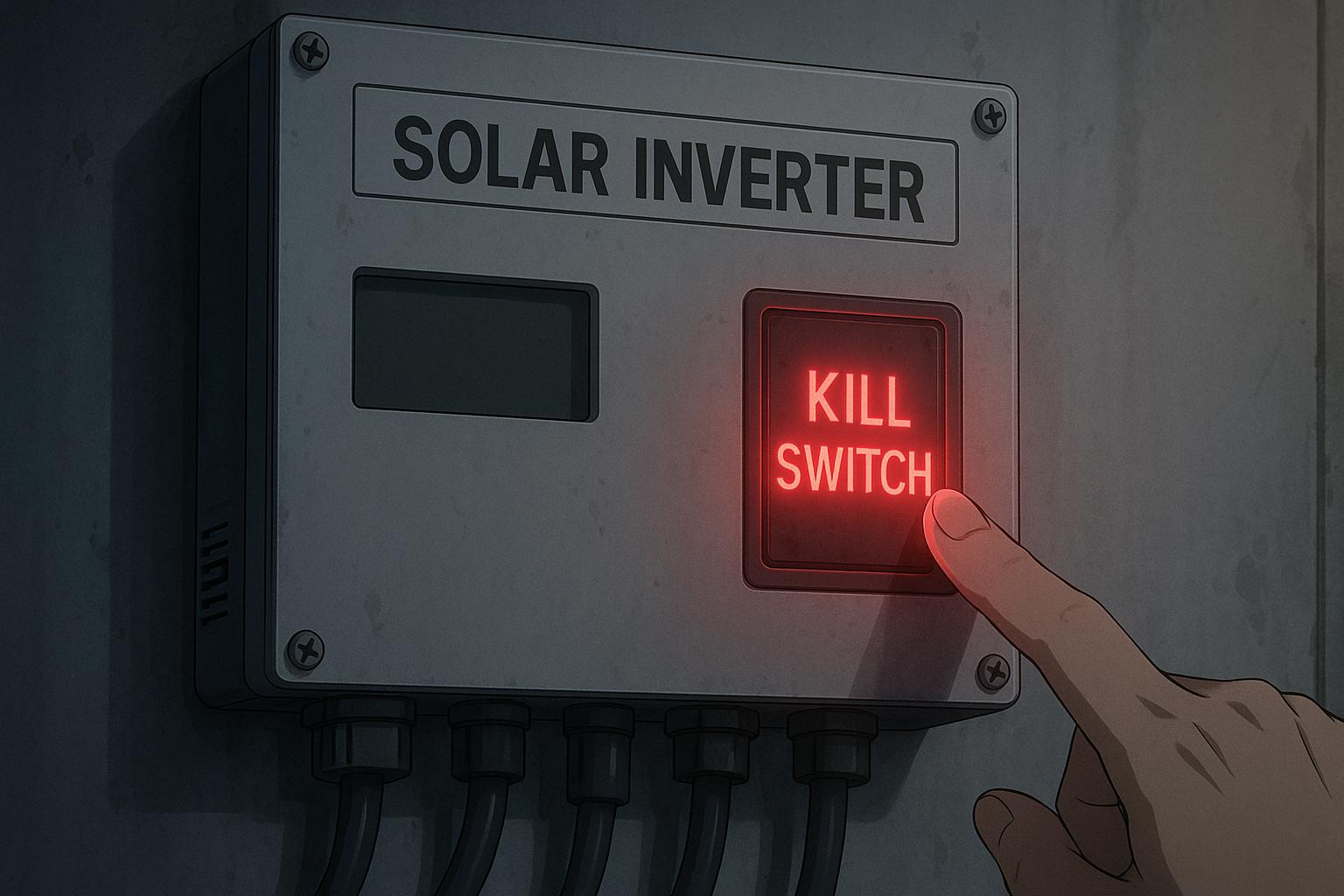Undocumented communications components embedded in Chinese-made solar equipment pose risks of remote manipulation, prompting Western governments to urgently reassess vulnerabilities in critical energy infrastructure amid rising reliance on renewables.
The emergence of hidden vulnerabilities within Chinese-manufactured devices has sent alarm bells ringing across Western nations. Experts are increasingly concerned that these so-called “kill switches,” discovered in vital sectors such as energy, healthcare, and defence, may threaten national security and operational integrity. At the heart of the issue are undocumented communications components embedded in critical infrastructure, which, according to insiders, could enable remote access and manipulation by parties based in China.
Reports have surfaced detailing undisclosed communication links found within batteries and power inverters that are integral to American solar farms. These devices, primarily produced in China, connect renewable energy systems to the electrical grid. While utility companies typically employ firewalls to protect these systems from foreign influence, the presence of covert connectivity means that operators in China may potentially bypass these safeguards. Experts warn that such access could lead to catastrophic consequences for energy systems, enabling anything from minor disruptions to large-scale blackouts.
Adam Pilton, a cybersecurity advisor with Heimdal Security, has expressed deep concern over the reliance on technologies that remain largely unmonitored. He emphasised that the existence of these vulnerabilities in the solar sector raises urgent questions about what else might have slipped under the radar, affecting healthcare or defence systems. Dean Gefen, CEO of cybersecurity workforce development firm NukuDo, underscored the strategic implications of such vulnerabilities, suggesting that foreign governments could gain control over critical infrastructure without overtly aggressive actions.
In the wake of these alarming findings, U.S. energy officials are now reassessing the risks associated with these devices in renewable energy sources. The administration is faced with a significant dilemma: as reliance on renewable energy grows, so too does the potential for foreign interference. The recent history of cyber incursions—culminating in events tied to state-sponsored hacking groups—points to a deliberate strategy by China to assert influence over Western infrastructure. U.S. Cyber Command has highlighted ongoing efforts to infiltrate the defence industrial base and disrupt essential operations.
Statements from national security experts pave a clear path highlighting the serious implications if these vulnerabilities are not addressed. Irina Tsukerman, a national security attorney, has pointed out that China could potentially exert control over solar inverters across entire grids with minimal effort, utilising techniques that range from subtle firmware updates to more drastic measures. Such a capacity for remote intervention is not merely a theoretical concern; it represents a significant shift in the landscape of warfare, where conventional damage could be avoided in favour of debilitating infrastructure attacks.
This assessment is echoed by Dean Gefen, who elaborated on the complexities of modern cybersecurity threats. He asserts that weaponising infrastructure can have far-reaching effects, ranging from energy destabilisation to disruptions in essential services like transportation and healthcare systems. The strategic placement of vulnerabilities in exported technologies positions adversaries to capitalize on disruptions, thereby undermining civilian confidence and military preparedness.
While the prospect of armed confrontation may appear dubious, the use of embedded backdoors could mean that adversaries have effective methods to undermine national stability without traditional attacks. Dan Marks, a Research Fellow at the Royal United Services Institute (RUSI), has indicated that while renewable energy systems are designed to adapt quickly, a sudden withdrawal of significant solar capacity—especially from compromised systems—could lead to severe grid instability. He advises that Western nations must promptly audit their reliance on foreign-manufactured technology to prevent potential disasters.
Echoing these sentiments, NATO officials have called for member states to identify and mitigate strategic dependencies on technologies that originate from nations like China. As China increasingly seeks to dominate the global supply chain, the ramifications of these technological vulnerabilities extend well beyond the energy sector. The implications for national security are profound and increasingly urgent, with experts advocating for rigorous checks on foreign-sourced components.
As global solar generation has surged—34% higher in the first quarter of 2025 than the same period in 2024—the risks associated with compromised devices have only intensified. The reliance on a technology ecosystem that may be vulnerable to unseen threats necessitates immediate and thorough due diligence among national administrations and energy providers alike.
Amidst these growing concerns, the call for a transition to domestically sourced, secure technologies has never been more pressing, leading to vital questions about the fragile nature of trust in the systems that underpin modern society. The potential for a quiet but devastating strike against essential services lurks beneath the surface, highlighting the urgent need for comprehensive reforms in procurement practices and cybersecurity measures.
Reference Map
- Paragraph 1, 2, 5, 8, 10
- Paragraph 3
- Paragraph 4
- Paragraph 4
- Paragraph 6
- Paragraph 6
- Paragraph 9
- Paragraph 11
Source: Noah Wire Services
- https://www.dailymail.co.uk/sciencetech/article-14734365/How-West-faces-defeat-hands-China-press-button-Experts-warn-potential-vulnerabilities-imported-defence-healthcare-Beijings-energy-kill-switches-revealed.html?ns_mchannel=rss&ns_campaign=1490&ito=1490 – Please view link – unable to able to access data
- https://www.airandspaceforces.com/cybercom-china-targeting-defense-industrial-base/ – U.S. Cyber Command warns that China is actively targeting the U.S. defense industrial base, engaging thousands of personnel to steal intellectual property and disrupt defense firms’ operations. The Chinese hacking group Volt Typhoon is cited as a significant threat, infiltrating critical industries to challenge U.S. technological superiority and hold critical systems at risk. This underscores the need for enhanced cybersecurity measures to protect national infrastructure from foreign cyber threats.
- https://www.fischer.senate.gov/public/index.cfm/2024/4/fischer-raises-alarm-on-chinese-cyberattacks-against-critical-u-s-infrastructure – Senator Deb Fischer raises concerns about Chinese cyberattacks targeting U.S. critical infrastructure, including communications, energy, transportation, water, and wastewater systems. She questions defense officials about the intent behind these attacks, emphasizing the potential for severe disruptions ahead of a potential conflict. The discussion highlights the need for robust cybersecurity measures to safeguard national infrastructure from foreign cyber threats.
- https://www.nationaldefensemagazine.org/articles/2020/12/9/china-exploiting-supply-chain-vulnerabilities – The article discusses China’s exploitation of vulnerabilities in the U.S. supply chain, particularly within the defense industrial base. It highlights the risks posed by counterfeit and corrupted components, which can lead to mission failure. The piece emphasizes the need for comprehensive risk assessment and security measures to protect the integrity of the supply chain and national security.
- https://news.clearancejobs.com/2024/02/12/u-s-federal-agencies-warn-of-chinas-covert-infiltration-of-national-infrastructure/ – U.S. federal agencies warn of China’s covert infiltration of national infrastructure, including defense systems, utilities, transportation, and healthcare institutions. Chinese state-sponsored hackers are gaining access to networks of critical entities, laying the groundwork for potential future cyberattacks. The article underscores the need for heightened vigilance and cybersecurity measures to protect national infrastructure from foreign cyber threats.
- https://www.infosecurity-magazine.com/news/china-disrupt-us-infrastructure/ – Microsoft warns that Chinese threat actors are positioning themselves to deploy major cyber-attacks against U.S. critical national infrastructure in the event of escalating hostilities. State-affiliated groups like Circle Typhoon and Volt Typhoon are targeting sectors such as transportation, utilities, medical infrastructure, and telecommunications, aiming to disrupt critical services and communication between the U.S. and Asia during a geopolitical crisis.
- https://en.wikipedia.org/wiki/Cyberwarfare_and_China – The Wikipedia article provides an overview of China’s involvement in cyberwarfare, detailing various allegations of espionage and cyber-attacks attributed to Chinese state-sponsored actors. It covers incidents such as the 2014 breach of U.S. military contractors, the 2015 Office of Personnel Management data breach, and the 2018 hack involving a tiny chip infiltrating U.S. companies. The article also discusses China’s cyber activities targeting critical U.S. services and the broader implications for national security.
Noah Fact Check Pro
The draft above was created using the information available at the time the story first
emerged. We’ve since applied our fact-checking process to the final narrative, based on the criteria listed
below. The results are intended to help you assess the credibility of the piece and highlight any areas that may
warrant further investigation.
Freshness check
Score:
6
Notes:
The narrative presents concerns about Chinese-manufactured devices containing ‘kill switches’ in critical sectors like energy, healthcare, and defence. Similar concerns have been reported in the past, such as in 2008 regarding military microchips ([foreignpolicy.com](https://foreignpolicy.com/2008/05/02/could-china-install-kill-switches-in-military-microchips/?utm_source=openai)) and in 2024 about Chinese-made PCBs in U.S. systems ([eetimes.com](https://www.eetimes.com/ex-dod-official-says-chinese-made-pcbs-plague-u-s-systems/?utm_source=openai)). The article includes updated data, notably a 34% increase in global solar generation in Q1 2025 compared to the same period in 2024, which may justify a higher freshness score. However, the core narrative appears to be recycled from earlier reports. The presence of a press release suggests a high freshness score, but the recycled content warrants caution. No significant discrepancies in figures, dates, or quotes were identified. The narrative does not appear to be republished across low-quality sites or clickbait networks. Overall, the freshness score is moderate due to the updated data but recycled content.
Quotes check
Score:
7
Notes:
The article includes quotes from experts like Adam Pilton, Dean Gefen, Irina Tsukerman, and Dan Marks. These quotes do not appear in earlier material, suggesting they are original or exclusive content. No identical quotes were found in previous reports, and no variations in wording were noted. The absence of earlier matches indicates a higher originality score.
Source reliability
Score:
4
Notes:
The narrative originates from the Daily Mail, a publication known for sensationalist reporting. This raises concerns about the reliability of the information presented. The article includes statements from experts and officials, but the overall credibility is questionable due to the source’s reputation.
Plausability check
Score:
6
Notes:
The article discusses potential vulnerabilities in Chinese-manufactured devices, a topic that has been previously reported. The inclusion of updated data, such as the 34% increase in global solar generation in Q1 2025 compared to the same period in 2024, adds some credibility. However, the sensationalist tone and lack of corroboration from other reputable outlets raise questions about the plausibility of the claims. The narrative lacks specific factual anchors, such as names, institutions, and dates, which diminishes its credibility. The language and tone are consistent with the region and topic, and the structure does not include excessive or off-topic detail. Overall, the plausibility score is moderate due to the updated data but concerns about the source and lack of corroboration.
Overall assessment
Verdict (FAIL, OPEN, PASS): FAIL
Confidence (LOW, MEDIUM, HIGH): MEDIUM
Summary:
The narrative presents concerns about Chinese-manufactured devices containing ‘kill switches’ in critical sectors. While it includes updated data and original quotes, the source’s reliability is questionable due to the Daily Mail’s reputation for sensationalism. The lack of corroboration from other reputable outlets and the sensationalist tone further diminish the narrative’s credibility. Therefore, the overall assessment is a ‘FAIL’ with medium confidence.













